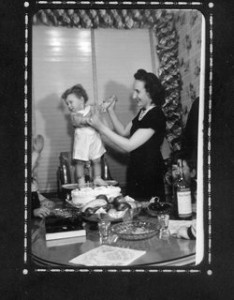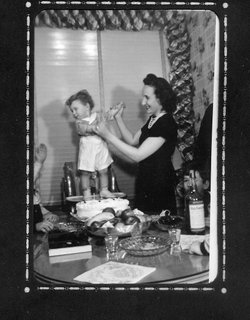 I know I’m more than half right about this, so please bear with me.
I know I’m more than half right about this, so please bear with me.
In mathematics there’s a concept called proportionality. Directly portortional means that if you travel faster, you’ll go farther. Inversely proportional means that the more people you have digging a ditch, the sooner it will be done. Grief is, for most of us, a form of direct proportionality, and this is the hidden blessing in it.
It’s been exactly four weeks since the passing of my mother. I wrote about it extensively in a series of “Grieving for My Mother” blogs. The pain is still intense. I live my daily life much as I always have, but the smallest thing makes me pause and remember her with that hollow sense of regret and the wishing she was still here. Something wonderful happened to my daughter, and my first impulse was to call my mother. When planning for an upcoming holiday, I breifly thought about flying her up to be with us. My unfiltered, unconscious mind will not let go, even though my conscious mind is dealing with all the follow-up technicalities of a parent’s death.
hollow sense of regret and the wishing she was still here. Something wonderful happened to my daughter, and my first impulse was to call my mother. When planning for an upcoming holiday, I breifly thought about flying her up to be with us. My unfiltered, unconscious mind will not let go, even though my conscious mind is dealing with all the follow-up technicalities of a parent’s death.
Back to math. The more you have loved, the more you have treasured a relationship, the harder it is to leave it behind. Grief for someone you truly loved is in direct proportion to how much you loved them, how connected your lives had become, whether tangential or intertwined. Substantial grief is not a weakness or a mental illness, but a directly proportionate reaction to the richness of the life you once shared with your deceased loved one. You can stop thinking of your grief as dysfunctional, and instead accept it as a commemoration of all that person meant to you. When you are moved to cry out of despair, do so without regret. Cry knowing you honor that relationship by doing so.
Is it always the case that grief is directly proportional to love? No, sorry to say. I’ve known some, especially elderly couples who should, had they been born in a later generation, would have divorced years–no, decades–ago. I’ve seen their grief for what it is; it’s not about the past, it’s about facing the future alone. It’s more about fear of being on one’s own in a most vulnerable time of life.
To answer the question of when will my grief end, I always answer when you pass; but it changes over time. If you subscribe to Continuing Bonds Grief Theory, grieving evolves into a permanent, but not unwelcome, sense of loss. Grief can be a disguised blessing; it means you and your deceased loved one, be it a parent or spouse or friend, enjoyed a rich life together and you are blessed with wonderful memories.
If you want to express yourself to your deceased loved one and share the intensity of what you once had, try therapeutic grief writing through AfterTalk’s Private Conversations. Go to the AfterTalk homepage, register (it’s free), then go into Private Conversations and give it a try.
Be well.


Grief can be a bit like walking into a deep fog where small steps are preferable to blind leaps. We’re not exactly sure what may lie ahead, but if the sense of forward motion feels preferable to staying inert, then I invite you to take the step. Name what you’re feeling. Allow a trusted person to witness it. Liberate your soul. Open up room for gratitude and allow love to replace fear and hidden emotions such as grief.